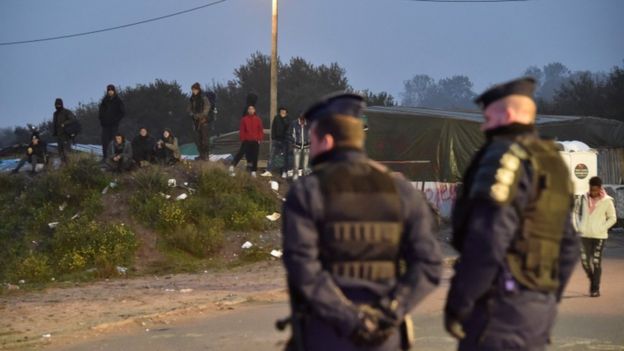More than 1,200 police and officials in France have begun an operation to clear the “Jungle” migrant camp in Calais.
The camp has been housing some 7,000 people in squalid conditions.
Migrants queued peacefully to be processed, and the first of some 60 coaches that will carry them to refugee centres across France, has now left.
There is concern that some migrants will refuse to go because they still want to get to Britain, and there were some clashes over the weekend.
The demolition of the camp is expected to take place on Tuesday.
The UK has begun to accept some of the estimated 1,300 unaccompanied children from the camp.
The first group without family ties to the UK has arrived in Britain under the “Dubs amendment” rules, which grant refuge to the most vulnerable.
The processing points at the Jungle camp opened at about 08:00 local time (06:00 GMT).
The BBC’s Simon Jones, at the camp, says queuing had begun four hours earlier.
He said most people seemed in good spirits despite the slightly chaotic scenes.
The migrants are being placed into separate queues to determine who are in families, travelling alone or whether they are in vulnerable categories.
After processing they will leave for various parts of France and be given the opportunity to claim asylum. If they do not, they could face deportation.
There are 7,500 beds available in centres across France for the Calais migrants.
The first coach left less than an hour after processing began – carrying 50 Sudanese to the Burgundy region, AFP reported.
Children will be housed in the camp’s converted shipping containers while the rest of the Jungle is dismantled.
From Tuesday, heavy machinery will be sent to clear the tents and shelters that have been left behind.
The whole operation is expected to take three days.
The French interior ministry said it “does not want to use force but if there are migrants who refuse to leave, or NGOs who cause trouble, the police might be forced to intervene”.
One Afghan migrant at the camp, Karhazi, told the AFP news agency: “They’ll have to force us to leave. We want to go to Britain.”
BBC
 Q FM Africa's Modern Radio
Q FM Africa's Modern Radio
